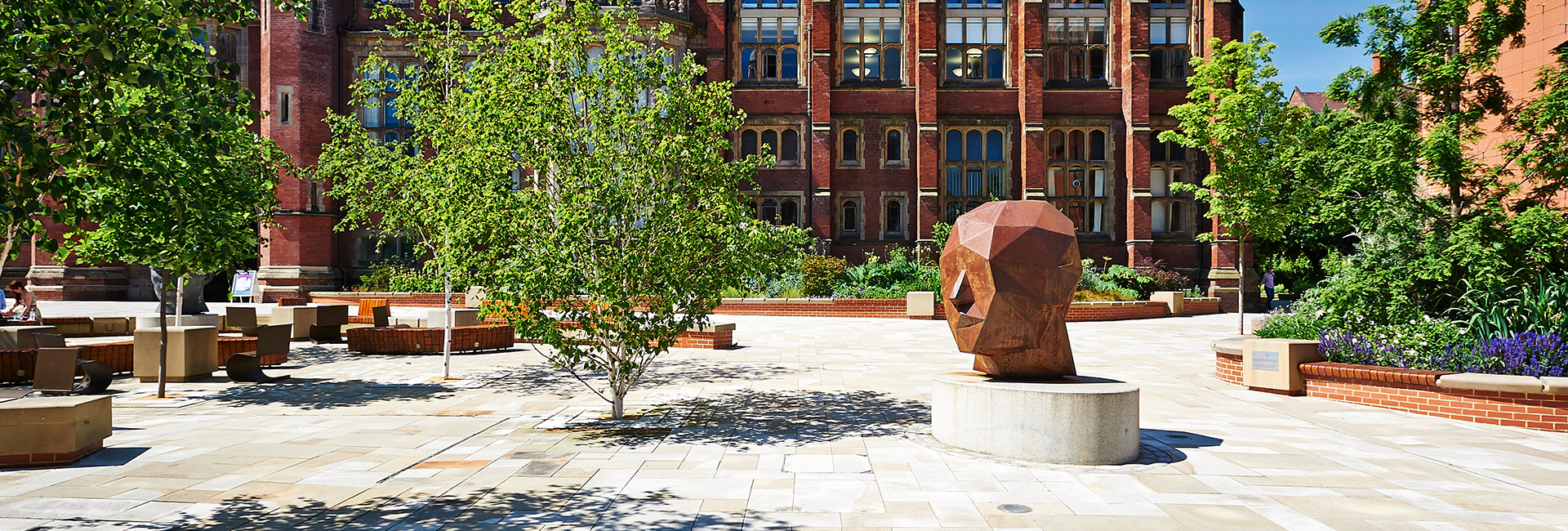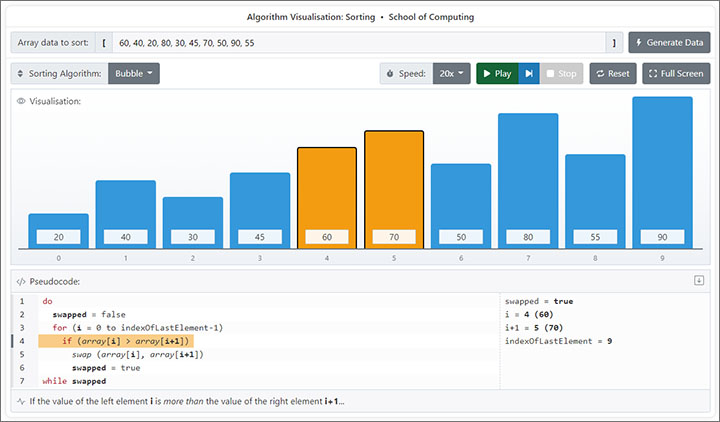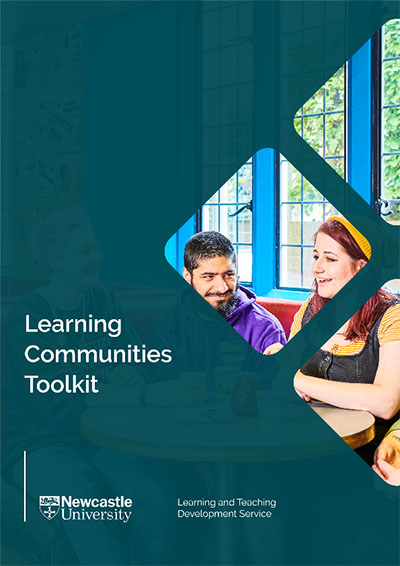Strategic Projects
NEW: A vision for education and skills at Newcastle University: Education for Life 2030+
How to propose a project
Projects are supported and resourced by colleagues in LTDS and FMS-TEL and are prioritised by a steering group comprised of PVC Education, Faculty Deans, Dean of Digital Education, and Dean of Lifelong Learning.
Project proposals need to be sponsored by the appropriate Dean and align with University, Faculty or School Priorities.
To discuss potential projects please contact LTDS or FMS-TEL (for FMS based projects).
School X Climate Change Masters and Module (HaSS)
The Digital Education Projects team in LTDS is supporting the process of curriculum and content development for a new interdisciplinary PGT programme: Leadership in Climate Change and Sustainability, which launched in September 2024.
DEP assisted School X colleagues to achieve both module and full programme approval. The project is in support of the university’s Sustainability agenda as well as having a wider remit as a proof-of-concept for exploring new models of educational delivery including interdisciplinary and cross-faculty teaching.
As part of the project a pilot module "Facing up to Climate Change" was developed for 2023/24 and offered to students in both HaSS and SAgE.
SAgE Foundation Year with Engineering, Maths, Stats and Physics (SAgE)
The purpose of this project was to redevelop and focus the existing SAgE Foundation Year programme. Providing a programme identity for students and redevelop existing material to aid students’ development throughout.
The aim of the foundation year programmes is to provide high quality students with missing maths or physics “A-levels” (or equivalents) a competitive advantage over standard entry 1st year students by closing their knowledge gap and developing their knowledge and competencies knowledge beyond standard entry requirements.
Project team (heading two)
Ben Steel - Learning Design & Curriculum Development Advisor
Dr Tiago Marinheiro – Module leader and Lecturer
Dr Kate Henderson – Senior Lecturer in Maths
Vicky Hall – Lecturer in Maths
Dr Yongchang Pu – Lecturer in Mech-Marine, Offshore and Subsea Tech
Dr Alex Svalova – Lecturer in Statistics
Dr Alasdair Charles – Lecturer in Chem-Adv Materials and Electrochem Eng
Dr Adrian Oila – Senior Lecturer in Chem-Adv Materials and Electrochem Eng
Philip Hyde – Lecturer Mech-Bioengineering
A programme community has been created to support the cohort identity for Foundation Year students. There is now a design concept and scaffolding for the community and all modules associated to the programme. This has provided a uniformed look and feel for students, to support the cohort identity.

The maths content has totally been remodelled and the content created by Kate and Vicky will support students with their maths development. As the majority of the programme is maths, this was essential to the success of the project.
Digital Capabilities (LTDS and FMS TEL)
Piloting JISC Discovery Tool in a range of student facing contexts, evaluating the value of the tool, reporting on effective practices around its use. Exploring its use with NU colleagues (PS and academic). Final project report presented at Digital Education Sub Committee May 2024 recommending continued use of the JISC Digital Capabilities Framework, but pausing the use of the Discovery Tool.
AESSC programme development and module design (SAgE)
Project duration: August 2021 – September 2023
LTDS are currently working in partnership with AESSC colleagues in the School of Natural and Environmental Sciences (SNES) on the redesign of nine UG programmes in Agriculture, Food and Land Management, and Earth and Environment Sciences. The redesign follows an industry review of the whole curriculum and aims to ensure students graduate with the employability skills required for the future of work, a global perspective of their discipline, the opportunity for inter-disciplinary collaboration, and a broad understanding of the UN Sustainable Development Goals.
The foundations for this will be achieved through the design and development of three 20 credit modules to be shared as common modules across all disciplines in stage one. These modules are being carefully designed to meet the requirements outlined in the review, and in consultation with staff. As part of this process, we are also undertaking a holistic review of student assessment and skills development journey across all programmes, as well as creating 360 virtually tours of NU farms.
The video below provides more information on the programme review.
Project milestone so far:
- Holistic programme review;
- designing and developing the common modules;
- curriculum review workshops;
- programme level assessment and skill development workshops;
- A promotional video has been created to share the story and progress of the review so far with colleagues, students and Industry (shared above);
- content development, including a suite of visual identity materials, module trailers, open days materials and virtual tour of the NU Farms;
- students and alumni consultations;
- assessment and digital technology workshops.
The curriculum review, including module and credit changes, constitutes the main output of the project. Three new common modules have been implemented to incorporate new curriculum approaches, such as multidisciplinary working and problem-based learning. This implementation required collaboration between academics and curriculum advisors. Additionally, the project encompassed several other strands, which now serve as examples of successful collaborative approaches between academics, professionals, and academic services.
Student skills journey
Workshops and meetings, facilitated by LTDS involved input from industry and module leaders who mapped the core skills addressed in their modules and assessments. As a result, a visual representation of the skills journey for students was created, prepared by LTDS content developers. This journey has been aligned with our reflective practice tool NU Reflect and integrated into personal tutoring sessions. Consequently, students have access to reflection templates and the ability to tag the skills identified by academics and industry partners. They can track their skills development and compile a repository of examples that demonstrate their proficiency in these skills. This proves highly useful when responding to behavioural questions during interviews.
Virtual tours of Newcastle University Farms
Through a series of workshops facilitated by LTDS, group scoping meetings, individual meetings, along with collaboration among content developers, curriculum advisors, researchers, and lecturers, interactive virtual tours of two farms have been created. Colleagues responsible for managing the farm and conducting research there provided content on projects and facilities. Content developers produced videos and animations, while curriculum development advisers aided in embedding the final result into the curriculum. Consequently, farm tours are now utilised not only to introduce the facilities but also to enhance the learning experience, for instance, by enriching fieldwork. Importantly, the use of H5P allows academics and colleagues managing the outstations to easily edit the tours in the future, even after the project concludes.
View: Cockle Park Tour| Nafferton Tour
SDG Mapping
As part of the project, we have also mapped the Sustainable Development Goals (SDGs) across the AESSC. The primary objective of this mapping exercise was to raise awareness of the SDGs among academic colleagues, demonstrate students' journey in sustainability education, and encourage colleagues to explicitly incorporate more sustainability and SDG content into their curriculum. Although the report is still in progress, the general recommendations align with the aims and outputs of the entire project. For instance, the need for a more multidisciplinary approach has been identified as an important driver of sustainable education, equipping students with competencies for a sustainable future.
HCA Communities (HaSS)
Project overview
In an evaluation of the Canvas Communities of History, Classics and Archaeology (HCA) students, it was discovered that there were 16 Canvas Communities used for various stages and subjects, which resulted in fragmented resources, difficulty navigating, high administrative burden, communication challenges and an inconsistent student experience.
Dr John Holton, Director of Education (HCA), enlisted the support of colleagues from LTDS Digital Education Projects team to work with nominated colleagues in HCA to deliver the new community in time for 2023/24 Induction period.
Project team
- Dr John Holton, Director of Education (HCA)
- Nuala Davis, Digital Education Projects Manager
- Alex McKee, Learning Design & Curriculum Development Advisor
- Devin Louttit, Content Development Co-ordinator
- Lottie Garrett, School Manager
- Rachel Barron, Education Coordinator
- Chloe Burn, Learning & Teaching Coordinator
- Jen Kain, Lecturer in History, Classics and Archaeology
- Philip Garrett, Lecturer in Japanese History
- Gosia Rabenda Derman, Learning Design & Curriculum Development Advisor
Project outcomes
As of September 2024, the team successfully established a single HCA school level resource to provide student access to essential resources and support, whilst reducing administrative overhead and simplifying communication with groups of students.
In a post-induction week survey, 85% of students had accessed the HCA Community, and 95% of those found the community helpful. Anecdotal evidence suggests that students, particularly Combined or Joint Honours students, appreciate that staff contacts and hours are ‘all in one place’.
The project has significantly benefited the School by successfully achieving several key objectives:
- The design, implementation, and launch of a single school community has fostered a centralised hub, enhancing accessibility to resources and support for students.
- Through utilising student feedback, the project has effectively adjusted and simplified navigation, contributing to an improved user experience.
- The provision of training and documentation for key HCA colleagues, including maintenance of style conventions and reformatting of existing content, ensures the sustainability of the community.

Canvas community template
An unexpected benefit of developing this Community is its applicability outside of HCA, offering other schools an effective model for updating their own Canvas Communities and improving overall student experience. Using the HCA Community structure, we developed a Canvas Community Template which can be found on Canvas Commons, and includes the student-informed navigation structure and user-led style choices (e.g., breadcrumb trail and drop-down menus). The template has already been well received at the DESC HaSS meeting and DoE Forum.
To use this template:
- Log into Canvas.
- Go to Canvas Commons and search for 'Canvas Community Template'.
- Download/import the content.
- Use the 'Notes to Editor' section to help you edit the template for your School.
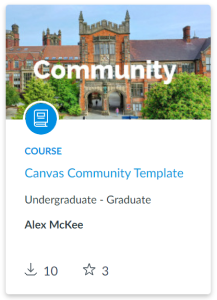
Philosophy Living Archive
Project Duration: July-December 2023.
Philosophy are developing a new liberal arts programme for delivery in 2024/25. To support this, the school wanted to create a public facing site showcasing academic and student work, providing a living archive or Book of Change. The site needed to be public facing, attractive to visitors, ideally with a tiled, mobile friendly interface. Students would need to be able to edit and add content to the site.
With these requirements, the university's Blogs platform was identified as the best way to create the site as it provided public access while still allowing students relatively easy access to edit. We worked with the Head of School on a structure to make navigation of the site simple, and give appropriate space to all of the materials that would be added to it in the coming years. We also worked to the schools specifications on how the site looks, moving away from some of the more traditional philosophy-related images such as white statues.
The final site is available to view here: Philosphy@Newcastle Living Archive.
Documentation and guidance was also created to hand over to the school, allowing for ongoing maintenance and content creation to be held by the school.
Project Team:
- Dr Stephen Overy, Head of School (Philosophy).
- Glen Campey, Learning Design and Curriculum Development Advisor.
- Alex McKee, Content Development Co-ordinator.
Audience Interaction Systems (LTDS and FMS TEL)
To review our current audience interaction system subscription to Ombea and establish whether a better system should be purchased.
Completed in Summer 2023 with the introduction of Vevox
Module Refresh MCR8032 & MCR8009
Module Refresh for MCR8032
FMS TEL was approached to assist in the redevelopment of this module. This module is an introduction to clinical research delivery in practice, and students are distance learners working in healthcare, hoping to start working with clinical trials in their areas of specialism. Some learners will be very senior within their work settings, and all are working alongside their studies. Old or outdated materials will be removed and replaced with up-to-date content. The module will make use of interactive technologies such as NU Reflect where needed to support delivery, though most activities are based around reflective writing and commenting. The module goes live in January 2023.
Module Refresh for MCR8009
FMS TEL was approached to assist in the redevelopment of this module. This module is an introduction to research ethics and the ethical approval process for clinical trials, and students are distance learners working in healthcare, hoping to start working with clinical trials in their areas of specialism. Some learners will be very senior within their work settings, and most are likely to be working alongside their studies. Rebecca Maier, along with other teaching staff, wish to redevelop and update the module, staring with an update of the assessment rubric. The amount of students on this module is also set to increase dramatically, and learner engagement will be strongly encouraged and enabled by the types of activities selected. This will precipitate more teacher-student engagement without adding too much to the workload of teaching staff in terms of marking and responding.
Captioning School Dental Sciences
SDS Captioning
We worked on a short project to report to the Digital Education Sub-Committee on the effectiveness and efficiency of student captioning on specialist lecture materials. The aims of the project were;
- To ascertain levels of accuracy with automated captioning.
- To gather data on how much time it takes to manually edit captions, and how much money this would cost if hiring students to do this via JobsOC.
- To test the processes involved to make sure they are efficient and workable, including working with Panopto, downloading caption files, administrating the workflow.
The results of the project were shared with Digital Education Sub-Committee
Exploring 3D Anatomy (FMS)
Project overview
The FMS TEL team have worked to bring a Massive Open Online Course (MOOC) to life. The course, Exploring 3D Anatomy, is an active, hands-on, and engaging online course now available to Newcastle students and staff! The course was designed by Dr Iain Keenan of Newcastle University and Mr Leonard Shapiro of the University of Cape Town, and has been built on Canvas with their collaboration.
The practical exercises in the course are demonstrated by Iain and Leonard on video, allowing students to access the content at their own pace. These videos show the exercises in detail and allow students to hear the conversation as the exercise unfolds. Videos are short and simple to follow and have been captioned by the team to ensure clarity.
The course is available on our CPD Platform.
Combined Honours HSS1111 and Community (HaSS)
Project duration: June 2022 - September 2022.
Combined Honours in School X identified a need to rethink their approach to new student induction. Because of the nature of the subject area, students were getting varying experiences of induction in different subject areas.
During the pandemic, they created an online course to address this, and sought help from LTDS to make the course more engaging and usable within the Canvas environment. The resulting course combined wider university induction materials with content created specifically for combined honours students, and gave the students a more consistent induction experience, which was fully online.
The approach to content and learning activities was presented to students earlier in the summer at a focus group, where those present responded positively to the activities presented, particularly to the variety of types of activity, and that presentation of information was paired with something to do alongside it (e.g. readings or talking head videos with quizzes or discussions that linked to them).
Another part of this project was an overhaul of the school's Canvas Community, in response to student feedback. The previous Community site was lacking navigation, with all materials simply listed in the Modules area of the site. LTDS worked with the school to design a new Home page that provided links to the various resources and areas of the Community, as well as streamlining what was available and making everything easier to find.
Project Team:
- Ruth Furlonger, DPD (Combined Honours).
- Megan Sormus, Student Engagement Officer (Combined Honours).
- Glen Campey, Learning Design and Curriculum Development Advisor.
- Kevin Vaughan, Content Development Co-ordinator.
Pre-professional identity for Law students (HaSS)
LTDS, the Law School and the Careers Service have worked together to reshape and invigorate how employability resources are presented online, to ensure they are communicated to students in a dynamic and attractive way and embedded more regularly and visibly within the curriculum. In the process, a new visual identity for the school has been created with new digital assets and document templates.
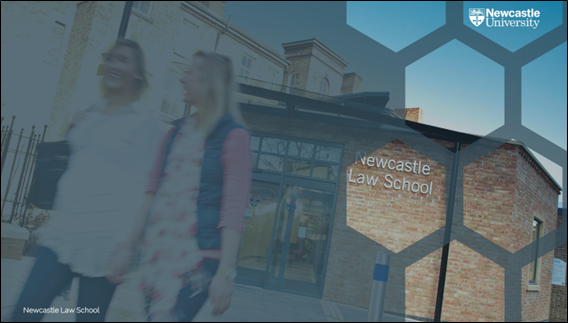
Refurbishing the Employability Canvas Community:
Following the LTDS graphic redesign of the community, LTDS, Newcastle Law School and the Careers Service worked together to reorganise and retitle existing content from the previous community, to create a richer and more easily-navigated user experience for students.
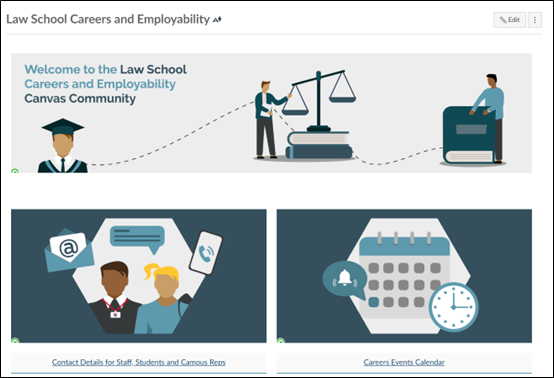
Law School Career Destinations – Creating a Bank of Video Interviews:
Eighteen interviews with Newcastle Law School alumni were conducted, each featuring a distinct role and career path. All were filmed and edited within LTDS with attendant graphics and music, and are now embedded in the canvas community for all current Law School students to view.
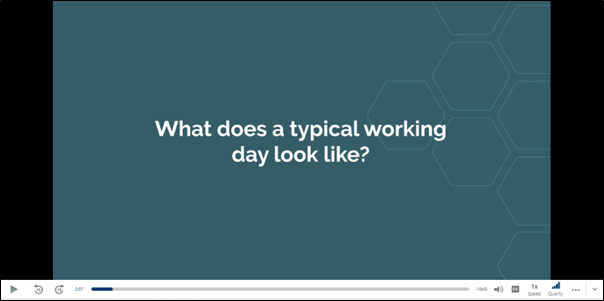
One of the significant learning points across this project, which shaped its planning and delivery, came from the interviews with Law School alumni. Many were able to articulate and promote the diversity of graduate employment prospects for Law Degree programmes usually so closely aligned with specific careers in the legal sector i.e. solicitor and barrister. An important theme communicated through the video interviews is the transferability of a Law Degree, and how this transferability can impact favourably on motivation whilst studying at University.
Project Team / Contributors
Dr Kieran Rafferty – LTDS Lead
Gosia Rabenda Derman – Learning Design and Curriculum Development Adviser, LTDS
Kevin Vaughan – Content Development Coordinator, LTDS
Dr Elliot Winter - Lecturer in International Law, NLS
Chris Fletcher - Undergraduate Degree Programme Director, NLS
Samantha Ryan - Lecturer in Law
Prof. Ben Farrand - Professor in Law & Emerging Technologies
Jos Harrison – Careers Consultant, Careers Service
Dalia Aizi - Student Experience/Engagement Officer
Joanne Pinnock - Examinations Secretary
Newcastle Law School Students and Alumni
SML Communities in Canvas (HaSS)
Project duration: December 2021 - September 2022.
The School of Modern Languages wanted to create a new Canvas Community space to improve upon their existing one. A particular need was identified for a portal space to provide information and resources for the school. Of particular importance was a means for students on their year abroad to still have a connection to the school.
LTDS worked with the school on a new Community site that aimed to keep away for using Canvas' Modules feature, and instead have something that functioned more like a website. A new navigation was created, based on twelve sections that appeared as tiles on the home page, with breadcrumb links to help site users move around and find what they need.
The Community was received positively by students present at SSC meetings through the year, and handed over to be maintained by the school at the end of the project.
Project Team:
- Andrea Wilczynski, Head of School (Modern Languages).
- Dr Sandra Salin, Director of Education (Modern languages).
- Aisling Hood, Administrator (Modern Languages).
- Glen Campey, Learning Design and Curriculum Development Advisor.
Computing: Visualising Algorithms and Data Structures (SAgE)
Project overview
This project sought to develop interactive learning objects to help visualise key algorithms and processes used in Computing (for example, algorithms used in searching and sorting). These were designed to help first-year students make a connection between the algorithms and data structures learned about in class, and the algorithms and data structures used in practical sessions and future work.
Project team
- Terry Charlton (LTDS)
- Nick Cook (Senior Lecturer, Computing)
Demo: Sorting algorithms
SME: Staff Training for Regional Clinicians (FMS)
Project overview
NHS Trust Clinicians are recruited on an annual basis to deliver teaching to our medical students. The School of Medical Education staff development team run monthly forums for both new and returning clinicians but require help with more technical training needs, therefore they contacted the FMS Technology Enhanced Learning team.
The Medical Education team works with clinicians from a range of trusts including Newcastle, Northumbria, Teesside, Durham and Sunderland. Due to I.T. restrictions within the NHS Trusts, the clinicians are somewhat limited in the online tools that they have access to: Teams is the only option that they have for synchronous meetings and sessions. One issue with this is not all Trusts have access to the same Teams licences, meaning training has to be very carefully tailored to individual needs and that our usual Newcastle University training and resources is not wholly suitable.
Training needs are longitudinal in response to the regular updates provided by Teams software. Sessions include updates on both the pedagogical and practical advantages of using Teams to support teaching.
Completed Training:
Engaging Learners; Interactivity; Advanced Features in Teams
Project Team:
Gemma Mitchelson (training lead, Learning Enhancement and Technology Projects Advisor, FMS)
Dr Richard Thomson (Clinical Sub-Dean: Northumbria Base Unit and Sub-Dean for Staff Development, School of Medical Education)
Catherine Wallace (Learning & Teaching Assistant: Staff Development, School of Medical Education)
Online Exam Support (FMS)
Project overview
In response to the Covid pandemic, schools within the Faculty of Medical Sciences needed to move key assessments online. Due to the nature of these assessments, it was not suitable to follow the university guidance to implement open 24-hour exams. Of key importance was the issue of exam integrity and security.
Stage one of the project was to scope affordances available within the Canvas VLE and to make modifications to the assessment questions if appropriate. Stage two was to evaluate options for implementation of the exams. And the final stages included rigorous testing, alongside staff and student training and trials.
The following schools took part: Dental Sciences; Biomedical, Nutritional and Sport Sciences; Graduate School; and Pharmacy. However, the majority of the project was carried out in liaison with Dental Sciences.
The key project aims were:
- To agree development priorities in consultation with each assessment lead
- To support the design, development and implementation of a range of online assessment question types e.g. SBA, SA, OSPE (stimulus)
- To test and implement the assessments in a secure environment, maintaining exam integrity
- To trial use of Lockdown browser and Remote Proctoring
- To ensure inclusive approaches are used throughout the design, development and delivery stages, ensuring all students can access the assessments equitably
- To review the impact of remote, online assessments on both students and staff
- To take team based approaches to design and development stages which build capacity within academic and professional teams in Schools.
The core testing group consisted of the Dental Sciences Assessment team and FMS TEL team. Once processes reached a satisfactory stage, resources were shared and adapted by other schools.
The development team worked on testing affordances within Canvas and Respondus. We also assisted with question design and modification, system set up, monitoring and live technical support during the assessment periods.
Content checking was carried out in three ways:
- Professional Services and Academic: peers were identified and given reviewer access in advance to look at the content and ensure accuracy and appropriacy.
- FMS TEL: everything was technically checked:
- The technical quality of assessment materials and exam set up was checked.
- Everything was copyright cleared and appropriately licenced.
- We made no commitment to publish the course until we were happy that the quality was up to standard.
- Students: there was a thorough, systematic liaison with students via training and mock assessments. Feedback was sought and processes reviewed as needed.
The project was cyclical in response to the uncertainty of the pandemic.
Main Project Team:
Dr Sarah Rolland (Director of Assessment, School of Dental Sciences)
Dr Luisa Wakeling (Director of Engagement, School of Dental Sciences)
Dr Jo Matthan (Director of Academic Studies, School of Dental Sciences)
John Moss (Technology Enhanced Learning Manager, FMS)
Gemma Mitchelson (Learning Enhancement and Technology Projects Advisor, FMS)
SDS: Non-Modular Programme Support (FMS)
Project overview
The Director of Dental Education approached the Faculty of Medical Sciences Technology Enhanced Learning (TEL) team for support with non-modular programmes set up on Canvas. Initially we supported one Dentistry TEL Lead to develop a complex structure of Communities and Blueprints on the new Canvas VLE. However, this staff member left the university meaning a need for revisions to this structure, alongside wider team training to allow the Dentistry programmes to become more self-sufficient.
The main courses involved are:
School of Dental Sciences Staff Community
This contains staff training materials including use of Canvas, digital delivery, and online examinations. This is an open-ended community that can be rolled over each year.
School of Dental Sciences Clinical Community Blueprint
This links to each stage’s clinical attachments courses via Associations.
School of Dental Sciences Community
This gives generic school information, induction information etc.
Dentistry Exam Blueprint
This links to each stage’s assessment course for the Bachelor’s in Dental Surgery and Oral and Dental Health Sciences.
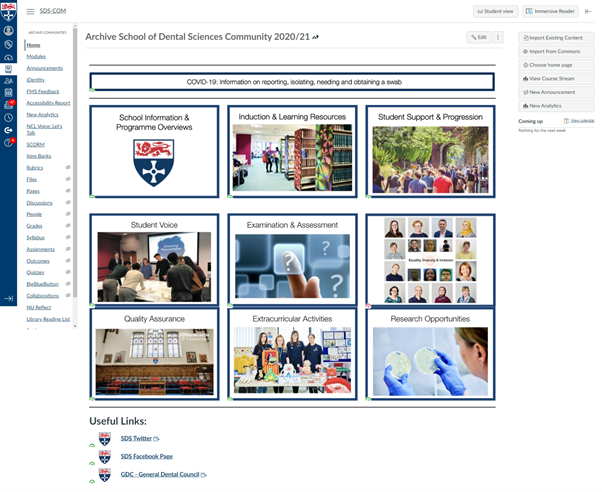
Project Outcomes:
- Planning and mapping core training needs for novice Canvas users
- Design processes so that individual course leads (Directors) can take ownership of Canvas courses
- Updated training to accommodate new approaches needed when rolling over content; including Blueprints, Associations
- Development of troubleshooting guides in response to staff needs
- 1:1 staff support
Project Team:
Gemma Mitchelson (Learning Enhancement and Technology Projects Advisor, FMS)
John Moss (Technology Enhanced Learning Manager, FMS)
Chris O’Connor (former Canvas TEL lead, School of Dental Sciences)
Dr Luisa Wakeling (Director of Engagement, School of Dental Sciences)
Dr Janice Ellis (Professor of Dental Education/Director of Dental Education, School of Dental Sciences)
Disruption to Studies Canvas Commons Module (HaSS)
Project overview
In February 2021, the HaSS faculty office wanted to design and develop a reusable Canvas Commons module to support students during times of disruption, whether that be industrial action, Covid lockdowns, or other periods of uncertainty.
Content included video explainers and Canvas-based text and support-resources. Students also provided first-hand advice and experiences for two videos centred around maintaining study motivation, mental health, and wellbeing during periods of disruption. Further videos we also created where students interviewed Dean of Education Sarah Graham to discuss some of the support mechanisms available to students.
Designed alongside colleagues and students, the content was readily available to download and add to existing courses and communities. The project was a collaboration between LTDS and colleagues from the HaSS faculty.
Telling the story
Following initial discusses and storyboarding sessions, it was agreed to create the follow content that could be used by schools within HaSS.
- Context and messages from individual schools
- Videos and guidance on supporting student learning. Including videos from students
- Videos and guidance on supporting student wellbeing. Including videos from students
- Details on how to get in touch a student’s school and student representatives
Video examples from the course.
Student Video
Students and Dean of Education Video
Student Voice & Learning Community (HaSS)
Project overview
This project sought to develop an online toolkit to help academic staff design and create effective learning communities. Key deliverables included self-help guidance, a collection of case studies of effective practice, and a reusable bank of online templates/resources that can be easily downloaded and repurposed.
Project team
- Terry Charlton (LTDS)
- Katy McDonald (Senior Lecturer, SACS)
- Susan McLean (Faculty Office, HASS)
Learning Communities Toolkit: Preview
Meet the Faculty Team Video (HaSS)
Project overview
In November 2021, the HaSS faculty office wanted to launch a meet the faulty team video. The video was designed to reboot, refocus, reintroduce, and connect the HaSS faculty to HaSS, the university, and most importantly the students.
The video is about the HaSS faculty being present, and that the office is here for the journey as well. It highlights the HaSS faculty’s passion, care, and enthusiasm for the students, the locations in HaSS, the values of Hass, and that they give our students a voice.
The video is not a corporate video or a branding exercise. It is about humanising and not corporatising. It is not about strategy or what the HaSS faculty is doing. It is how they can support and how they can support the Student Voice.
Telling the story
The video was storyboarded before production in collaboration between LTDS, the HaSS faculty office, and our students. To give a holistic view of design procedures, what the faculty was looking for, and the Student Voice.
There are two versions of the completed video. Firstly, a short one-minute version for social media platforms and a longer four-minute video for the HaSS faculty website. The video featured Sarah Graham, Head of Education, Sophie Brettell, deputy director of faculty operations in the HaSS faculty office, and two students Mack and Orla.
Short Video
Long Video
Biomedical, Nutritional and Sport Sciences: Lab Health and Safety
Project overview
In September 2020, the School of Biomedical, Nutritional and Sport Sciences launched their new Lab Health and Safety Module. This online package was designed to give Stage 1 students an induction into key areas of lab health and safety, but also as a revision resource for Stages 2 and 3. Future content development will look at additional resources specific to the later stages of study.
Development of this module required a complete redesign of lab health and safety resources, moving from paper-based module handbooks to interactive, online blended materials. We had to establish an infrastructure to support both staff and students with this change. We also used key design principles and frameworks to facilitate user engagement with interactive resources.
A collaborative team was formed between the Faculty of Medical Sciences Technology Enhanced Learning team (FMS-TEL) and the school of Biomedical, Nutrition and Sport Sciences (BNS) to amalgamate technological, pedagogical and content knowledge.
Project team
- Gemma Mitchelson (FMS Project Lead)
- Tracy Connell (FMS Content Developer)
- Ashley Reynolds (FMS E-Learning Technologist)
- Alison Gregory (BNS Technical Team Leader and School safety officer)
Telling the story
Newcastle University Business School: LDOF (HaSS)
Project overview
The LDOF Team's academic ambition in 2019 was to design and develop a portfolio of part-time, blended learning, postgraduate programmes: A Coaching and Mentoring MSc, a Strategic Leadership MSc and an Executive MBA, with the latter two aligned to the Degree Apprenticeship Framework. In realising their ambitions of a truly blended learning student experience, the teaching teams from across all three programmes worked in partnership with each other and LTDS.
This collaborative approach, involving many cross-programme curriculum design and development conversations, and facilitated workshops, brought together a unique combination of technological, pedagogical, and content knowledge. What followed from this was a much richer understanding of how to develop an enhanced and engaging blended learning experience. How to make the best use of educational technologies, and how to bring their cross-programme philosophy and pedagogy to life.
Project Team
- Dr Joanne James (Director)
- Dr Nicola Patterson (DPD Strategic Leadership MSc)
- Dr Jenny Davison (DPD Executive MBA)
- Dr Amy Stabler (DPD Coaching & Mentoring MSc)
- Dr Sandra Corlett (Senior Lecturer in Leader Dev & Org Futures)
- Dr Lucy Hatt (Senior Lecturer in Leadership Development and Entrepreneurship)
- Michelle Barr, Learning Enhancement & Technology Projects Advisor (LTDS)
Telling the story
In this short video the team share their programme development journey and showcase what they have achieved in a collaboration that brought academic content, pedagogical and technological knowledge together to create a portfolio of blended, and fully online Executive Education programmes.
Conferences
Invited Speakers
Michelle Barr, SFHEA & Dr Nicola Patterson: Global Online Ed 2021 "Using Elements of Gamification to Engage Learners in Executive Education" 20th May 2021.
Accepted Abstracts
Michelle Barr, SFHEA & Gemma Mitchelson: Three Rivers Conference 2021-Knowledge Exchange For Learning & Teaching In HE "Not just technology for technology’s sake: Working collaboratively to explore, develop and embed technology-enhanced learning" 25th June 2021
Michelle Barr, SFHEA & Dr Lucy Hatt: The nineteenth Academic Practice and Technology (APT2021) conference "Engaging work-based business learners in online spaces through the development of digital residency" 02 July 2021
School of Engineering: Flexible Stage 1 (SAgE)
Project overview
In October 2020, the School of Engineering launched their new Flexible Stage 1. This cross-disciplinary programme was designed to give stage 1 students a broad introduction to engineering, allowing them to explore the many different specialisms and career paths available to them (Civil Engineering, Mechanical Engineering, Electrical Engineering, Marine Engineering) before committing to a specific discipline at stage 2.
Development of this programme required a complete curriculum redesign as well as a shift towards collaborative module design and team teaching. Programme leaders also sought to embrace modern digital technologies and “blend” module delivery, demonstrating digital innovation and building upon the University’s strategic commitment to provide an “educational experience supported and enhanced by technology”.
This would position the school as a leader in Engineering education; ambitious, modern, forward-looking and capable of producing highly sought-after graduates that can engage creatively and critically in the digital workplace.
Telling the story
LTDS learning designers were able to help academic colleagues develop, explore and embed the use of technology enhanced learning within their teaching and assessment practice. As well as running vision and learning design workshops, we were also able to support colleagues in the best use of TEL tools, adding to the technological and pedagogical knowledge of the school’s programme team.
Institute of Coding
Project overview
The IoC was launched by the government in 2018. The consortium received a match-funded grant of £20million to develop innovative programmes and projects to digitally upskill the nation and help bridge the digital skills gap. By 2021 the consortium led by Bath University comprised over 200 employers, 20 outreach partners and 35 higher education institutions.
Newcastle University’s instance led by Professor Aad van Moorsel and Project Manager Melanie Dunnett is a two-million-pound match-funded project to create new Postgraduate Degree Apprenticeship Programmes and Continuing Professional Development (CPD) that focuses on widening participation in Computing and helps to digitally upskill the North-East workforce.
LTDS Support
For this project, the LET-P advisor Cagri Yildirim, was hired to ensure that the Design and Development of the Programmes met both the University’s Technology Enhanced Learning goals, the MSc and Apprenticeship requirements, and the IoC’s business goals. This included harnessing design thinking to bring different disciplines and stakeholders together, co-host industry workshops, co-lead the design and development of the Blended MSc Degree Apprenticeship in Software Engineering, and help academics and practitioners to realise the pedagogical, theoretical, and practical implications of their teaching approaches.
Telling the story
Design Thinking helped to democratise the voices of academics and professional staff, ensure the inclusion of external stakeholders' voices, enhance, and inform University Programme Approval processes, and create postgraduate programmes supported by the University, and the North-East region.
Further Information
- Contact us at IoCNE@newcastle.ac.uk
- View our industrial conversations on Twitter @IoCNE
- Learn about our programmes
- Degree Apprenticeships
- MSc DA Cyber Security
- MSc DA Data Analytics
- MSc DA Software Engineering
- Continuing Professional Development (CPDs)
- Health Informatics
- Lifelong Learning at Newcastle University
- Degree Apprenticeships
- Is a Degree Apprenticeship right for you?
